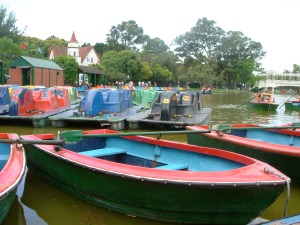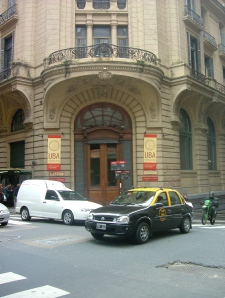Buenos Aires, Argentina
I thought that I could get away without having a despedida. As much as I like being the center of attention, I don’t like to be the reason for or the hostess of an event, especially when the event is saying good-bye to my best friends. I just couldn’t handle the concept of everyone getting together to talk about how much we’re going to miss each other.
When one of my friends decided to celebrate her birthday on Saturday night, I was relieved. She offered me the night first, but I liked the idea of being able to see my friends without ever having to actually acknowledge that I’m leaving. I may not be the one getting married, but I was hoping to run off to New Zealand and elope without anyone noticing. Besides, I was pretty sure that I wouldn’t be able to plan an evening more entertaining than Korean karaoke (you even get your own private room and machine). Unfortunately, my plan backfired.
Before I had even sung my first Britney Spears number, my friends were already asking when we were going to get together again. As I explained to them that I, like most women when they turn 30, wasn’t planning on dignifying my departure with a party, they nodded sympathetically before discussing amongst themselves potential places, times, and activities. By the end of the night, nothing had been confirmed, except my sneaking suspicion that friends don’t let friends leave the country without saying good-bye.
Sunday afternoon, the designated social coordinator of the group called to ask if I had made up my mind about the despedida. Of course I wanted to see everyone again, but I couldn’t decide which would be more depressing: spending time with my friends “one last time” or not. Not to mention the fact that I couldn’t think of a good pretext for seven people hanging out on a rainy Sunday afternoon.
In the end, my friend convinced me that no planning was necessary, and gave me a moving speech about needing to give my closest friends the opportunity to say good-bye, as if I had just died and was trying to decide whether or not to have a funeral for myself. I sent an email at the last minute, inviting everyone to my friend’s apartment that afternoon. Hours later, we were eating homemade avocado dip and chocotorta, gossiping about the previous night, playing Apples to Apples, and making each other laugh. The truth is that I was going to be sad no matter what, but it’s far better to be sad and in good company than sad and alone.
I think that what made my despedida so nice is that it was not anything out of the ordinary. It was just another reminder of how wonderful it is to belong to a group of people who love each other, especially one that doesn’t need an itinerary to have a good time. I’m glad that we had the chance to make one last memory in Buenos Aires, because I don’t know when, if ever, such a moment will arise again.
I’m great at being gone, but I’m terrible at good-byes. I get overly sentimental, wanting to do, see, touch, and taste everything one last time because I’m convinced that good-bye is forever. But this time, I know that Buenos Aires isn’t going anywhere, and neither are the memories or friendships that I made here. However, even though I will maintain my relationships and likely return to Argentina in the future, even if just for a visit, it will never again be exactly as it is now.
I think that part of what makes leaving Argentina so hard is that I’m not just saying good-bye to friends or a city. I’m saying good-bye to an era. When my friends came over to meet my mother, we took a Buenos Aires class picture. Staring at that photo later, I realized that three people were already missing – they left Argentina earlier in the year – and that nearly everyone else had plans to be gone within the next year or two.
Someone once told me that life is like a spiral – we go around in ever expanding concentric circles, passing by the same points, but always at a different point in our lives. Of course, different can be just as good or better, but when you like things the way that they are, it can be hard to let go. So, that’s why I don’t want to do anything special to commemorate my last few days in Buenos Aires. I prefer to carry on with business as usual, doing the things that have characterized and defined my life for the past three years, like run in the park, go shopping with friends, and write, because pretty soon, everything will change. I may be ready to move on, but I’m still sad for what I’m leaving behind (including all of the clothes that didn’t fit in my suitcase). In fact, I have to get going. My friend is waiting for me so we can order take-out, eat dinner on her balcony, and talk about the guy she’s dating.




Prize Winning Pumpkin: Celebrating American Culture Abroad
Published December 10, 2008 Argentina , Culture and Tradition , Social Commentary 1 CommentTags: Abroad, American society, Argentina, buenos aires, cultural differences, Expat, Social Commentary
Buenos Aires, Argentina
Taiko, according to Google, refers to both a kind of drum and a style of ensemble drumming which combines traditional Japanese percussion with karate movements. Performed in customary dress, taiko is a high-energy mix of music, dance, and martial arts, and it’s fabulous. Taiko drums have been in use for some 2000 years, but Taiko as it is performed today dates back only to the 1950s. In the 1980s, the Japanese government began sponsoring taiko groups as a way to preserve and promote Japanese culture both at home and abroad. There are now approximately 5,000 taiko groups in Japan.
As I sat there watching Japanese drumming in Argentina, I thought about how wonderful it is that Japanese immigrants have been able to maintain their cultural identity and share their traditions with both their children and their host country. And I began to wonder what an American Cultural Festival would like:
12pm: Beauty Pageant
1pm: How to Build the World’s Largest Ball of Yarn
2pm: Thomas Kinkade Cross Stitch Workshop
3pm: Pie Eating Contest
Large immigrant groups tend to inspire the foundation of organizations dedicated to improving cross-cultural relations, and to the preservation, teaching, and diffusion of the language, customs, and rites of the migrant community. I guess that because Americans tend not to emigrate, you don’t see a lot of American Cultural Societies in foreign countries.
Come to think of it, even though we don’t send people abroad, American language, culture, and commerce is so pervasive worldwide that I’m not sure that such an association would be necessary. Want to teach your expat children about American society? Turn on the T.V. Want them to learn to speak English? Send them to any local school. Want to introduce them to American goods and products? Look for the nearest Walmart. Still, for those of us who do live, work, or raise families abroad, it would be nice to have a building shaped like a skyscraper where we could play baseball, listen to hip-hop music, and eat a decent sandwich.
Of course, it’s wonderful that America does not produce many refugees or political exiles, and that people born in the United States tend to feel comfortable and welcome right where they are. But the downside to this is that we are not actively promoting awareness or understanding of our culture abroad, nor are we mingling with or learning from other peoples. If you ask me, a few more American cross-cultural associations in other countries might not be a bad thing.
Quite honestly, I’m saddened by the idea that everything people know about American culture, they learned from Friends. And I’m even sadder to admit that if I were open an American Cultural Society abroad, I’m not sure what services and activities it would offer, what events it would organize, or what traditions it would celebrate.
Any ideas?